Coronavirus: airlines start clearing the air on cabin hygiene
Airlines are singing the praises of medical-grade air filters while masks and shields have replaced pillows and PJs.
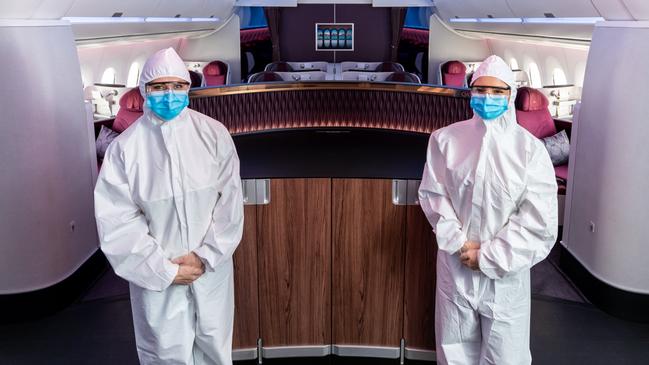
A year ago, airlines were competing fiercely to be the greenest carrier amid intense pressure from the Greta Thunberg-led “flygskam”, or flight-shaming movement.
Now in the midst of the COVID crisis, the flight shamers have fallen silent – largely due to the lack of flying going on – and airlines have found a new battlefield: hygiene.
In the space of just a few short months, face masks, hand sanitiser and antibacterial wipes have replaced in-flight magazines, pillows and pyjamas as on-board travel essentials.
Instead of in-flight entertainment, airlines are singing the praises of medical-grade HEPA air filters, and snacks wrapped in plastic have replaced fresh food.
According to Etihad Airways Australia and New Zealand general manager Sarah Built, the changes are the “new normal” and necessary to restore confidence in air travel.
The Abu Dhabi-based carrier is at the forefront of the clean revolution, even appointing “wellness ambassadors” for its flights to offer reassurance to customers and provide details of the health and sanitisation measures in use.
“Safety has always been our number one priority but now safety also encompasses the health and wellbeing of guests,” Built tells The Australian.
“I think the road to recovery is going to be all about instilling confidence and building trust again with people, trust that it’s safe to fly from a health perspective.”
Like many other international airlines, Built says Etihad has done a huge amount of work mapping out the entire journey to ensure the safety of passengers every step of the way.
“At Abu Dhabi Airport we’ve partnered with (Australia’s) Elenium Automation, who have some leading-edge, contactless technology,” she says.
“As well as temperature screening, this technology also measures heart rate and respiratory rate and gives a very good indication of whether somebody is fit to fly.”
An additional measure adopted by the United Arab Emirates, which may well be embraced by other countries, is the requirement that travellers have a negative COVID test 48 hours before flying.
Contactless
Built says they have “really tried to think of everything to convey that message of wellness”.
“We have some really amazing technology – self-cleaning handrails on escalators, as it goes around it cleans; touchless elevators; surface swab technology and all the social distancing measures that are part of everyday life now,” she says.
“We hope people will see how seriously we’re taking the whole new normal, and know that they will be well looked after.”
Initiatives promoted by other airlines range from United Airlines’ announcement it will maximise the air flow through the cabin for a cleaner environment, to Qatar Airways’ pledge to provide all passengers with face shields, as well as single-use masks, sanitiser and gloves.
Fiji Airways has assured travellers their checked-in luggage will be sanitised before being loaded on board, and Delta Air Lines is encouraging passengers to pack their own food and drink to “decrease physical touchpoints”.
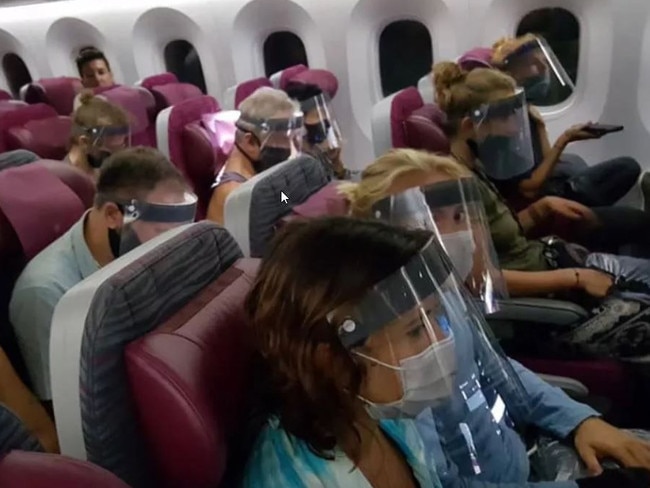
Although social distancing on board is tricky for airlines who rely on seats being filled to make money, carriers such as Cathay Pacific and Virgin Australia have promised to space out passengers where possible. First- and business-class passengers already have the advantage of some extra distance and even physical dividers between seats, and some airlines are offering additional safety measures for their most valued guests.
Qatar Airways is providing an extra tube of hand sanitiser for business passengers, and Etihad is handing out protective snood-style face masks treated with “microbe barrier” for its premium flyers.
Business travellers are also assured that despite cutbacks to the in-flight meal service to limit face-to-face contact between crew and passengers, they will still enjoy several courses, albeit served on a single tray. In Etihad’s case, premium passengers can use a buzzer to request service.
On the ground
It’s not only airlines vying to be the cleanest, and therefore “safest”, for travellers.
The new-found obsession with health and cleanliness is shared by airports, which have added floor decals to promote social distancing and hand sanitising stations at every turn.
Singapore’s Changi Airport has autonomous cleaners working to disinfect carpets around the clock, and Canberra Airport has installed thermal imaging cameras in security areas to detect passengers with elevated temperatures.
Australian Airports Association chief executive James Goodwin says strict COVID-safe cleaning regimes have been adopted in terminals across the country to ensure they are as hygienic as possible.
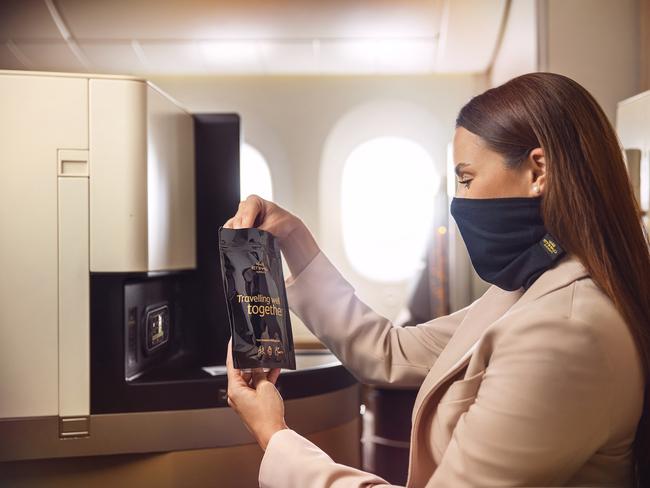
“Many of the larger airports have installed Perspex ‘sneeze guards’ on customer service desks to prevent the spread of germs, and trays at security screening areas are being sanitised immediately after use,” Goodwin says. “Social distancing signage can be seen clearly throughout the terminals and high-risk areas such as water fountains and play areas closed.”
Goodwin insists aviation remains Australia’s safest form of travel even in the current pandemic but Elenium Automation CEO Aaron Hornlimann believes more can and should be done.
Hornlimann’s cutting-edge technology company began work on a range of touchless devices early on in the COVID crisis when it became apparent any public facility that required human contact to operate would no longer cut the mustard.
To date, Elenium has come up with contactless self-service kiosks operated by voice commands or head movements.
The Melbourne-based firm is also responsible for the “fit to fly” tech in use at Abu Dhabi Airport that assesses people’s vital signs as they walk through security without any personal interaction.
Hornlimann believes some form of pre-travel medical check will have to be part of flying in the post-COVID world for the safety of all involved.
“You’d hope airlines and airports would do as much as possible prior to boarding if they’re going to pack in everyone together (on board),” he says.
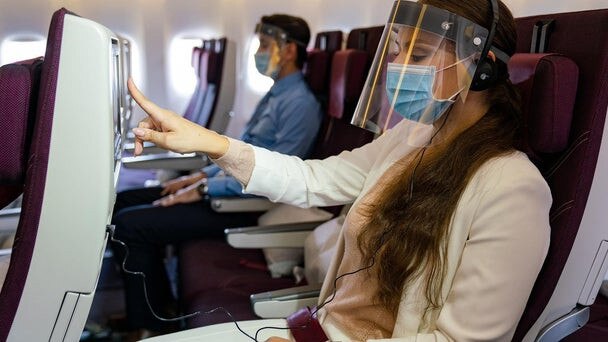
“(For the airlines and airports to say) ‘We’ll socially distance and we’ll rely on the internal features of the aircraft to keep people safe’, maybe that is enough, but I don’t know whether that will pass the pub test for people who are concerned with flying.”
It certainly does not pass muster for New York-based nurse Marion Yates Schiff, who has continued to fly regularly throughout the COVID crisis for work.
Appalled by the lack of adequate hygiene on flights, Schiff has developed an exhaustive regime to protect herself against infection on aeroplanes.
As well as donning goggles and a mask, Schiff carries disinfectant wipes to clean down smooth surfaces, and a spray for cloth seats.
“I try to board as early as possible to disinfect everything,” she tells The Australian.
“I usually bring a bottle of water. I don’t drink anything from an open container, and I don’t eat the airline food because I don’t want anything that’s been handled by dirty hands going into my mouth.”
Although she recognises the efforts being made by airlines to lift health and hygiene standards, she believes much more needs to be done.
“The grime that comes off parts of the seat on to my wipes shows the cleaning being done is not sufficient,” Schiff says.
“And every time I get on a flight I see the flight attendants are wearing a very simple mask, no eye protection. To me, those people are most at risk because they’re in the air every day.”
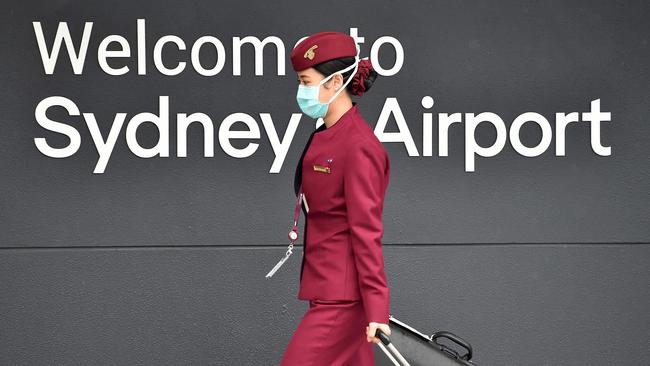
Insurance
The insurance industry recognises it has a role to play in the post-COVID world but is yet to work out exactly what that is.
When overseas travel is again permitted from Australia, insurance policies are unlikely to cover any COVID infection, regardless of whether a vaccine exists.
Insurance Council of Australia spokesman Campbell Fuller says he is unaware of any companies seriously contemplating some form of “pandemic cover”.
“The travel insurance sector is in constant and open dialogue with the broader travel sector, including travel agents and airlines, but the simple fact is insurers have to price the risk,” Fuller says.
“Pandemic risk is something that insurers have not been collecting premiums for; they haven’t contemplated it in their policies and the cost of covering a pandemic for international travellers would be incredibly high if an insurer had the risk appetite.”
In the event passengers are subject to pre-flight medical checks, further questions arise for insurance companies with regards to cover, particularly for those refused boarding due to an elevated temperature or respiratory issue.
Fuller says it’s not something that has been examined in detail but any such symptoms would certainly “raise suspicions” among insurers.
With international travel for Australians still many months off, Built says it remains to be seen whether travellers will choose airlines based on the extent of their COVID-safe measures.
But Etihad was taking no chances.
“It will be important moving forward how airlines have addressed this challenge, and the sort of measures and investments they’re prepared to make to ensure the health and wellbeing of their guests,” she said. “That part of it is critical.”


To join the conversation, please log in. Don't have an account? Register
Join the conversation, you are commenting as Logout